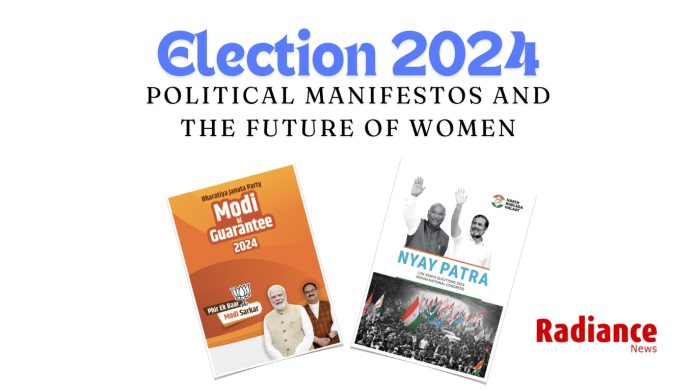Historical instances of unfulfilled promises cast a shadow over the current pledges. The upcoming election will test whether these promises can translate into tangible change or remain mere rhetoric.
– Syed Ahmed Ali
As India prepares for the Lok Sabha elections 2024, political parties are unveiling manifestos filled with colorful promises aimed at winning the support of women, who constitute half of the eligible voter base. Major national parties are introducing a range of schemes, such as the Lakpati Didi scheme, Mahalakshmi scheme, and initiatives for reserving 50% of central government jobs for women, alongside proposals like the Nari Shakti Vandan Adhiniyam and 1/3rd reservation for women in state assembly elections by 2025 and Lok Sabha elections by 2029. These promises extend into areas of health, hygiene, and other essential sectors.
However, there is significant skepticism regarding the promises made by the ruling Bharatiya Janata Party (BJP). Despite their claims, incidents of rape and harassment against women are reportedly on the rise. Criticism mounts as the BJP is accused of giving tickets to individuals accused of rape, and in some BJP-ruled states, there have been instances where convicted rapists have been greeted with garlands upon their release from jail. These actions raise serious concerns about the safety and justice for women under the current administration.
The continuing issues of violence against women, female foeticide and infanticide, lack of safety and security, gender-based violence, and inadequate access to education and healthcare remain unresolved. Additionally, the representation of women in legislative bodies is dismally low, with India ranking 148th out of 193 countries in terms of the number of elected female representatives in parliament. This highlights the urgent need to address these root problems to ensure dignity and respect for women.
It is crucial for every responsible citizen to consider these issues before voting. The need for safety, security, and a brighter future for women is paramount. When provided with a secure environment, Indian women have historically achieved remarkable feats. It is time to harness Nari Shakti (women’s power) to stand against those who exploit women and to use their votes and voices to demand real change.
For further discussion, we spoke with S Hafsah Sayeedah, a B.A. Political Science graduate and Junior Manager at IP DOME in Chennai, Tamil Nadu.
In the complex landscape of Indian politics, as the nation gears up for the 2024 elections, a pivotal question arises: What do the manifestos hold for the future of women in India? Despite women making up nearly half of the population, systemic inequalities persist, preventing them from realizing their full potential. This election presents an unprecedented opportunity for transformative change.
Economic empowerment is a central theme. With only about 20% of Indian women participating in the formal economy, manifestos propose targeted policies to unlock this untapped potential. These include subsidized skill development programs, access to entrepreneurial resources, gender-sensitive labor laws, and monetary assistance to foster an inclusive economy.
Education is another critical area. While there have been significant improvements in enrollment rates, quality education remains elusive for many girls, especially in poverty-stricken rural areas. Election manifestos promise to incentivize female education through scholarships, mentorship programs, and increased university quotas.
True progress, however, extends beyond economic and educational metrics to include social and legal dimensions. Addressing gender-based violence and discrimination requires a multifaceted approach. Manifestos this year pledge to strengthen efforts in these areas, promoting gender sensitization in communities and institutions to challenge ingrained attitudes and foster a culture of respect and equality.
Yet, skepticism remains. Historical instances of unfulfilled promises cast a shadow over the current pledges. The upcoming election will test whether these promises can translate into tangible change or remain mere rhetoric.
The stakes are high for Election 2024. Will it mark a turning point in the journey towards gender equality, or will it be another chapter in a long and arduous struggle? The outcome will depend on the actions and reactions of the citizens in the coming years.




